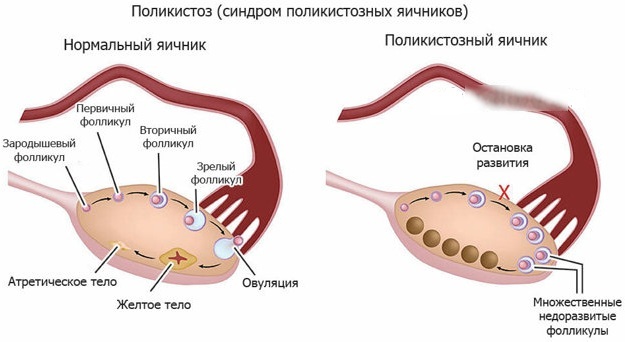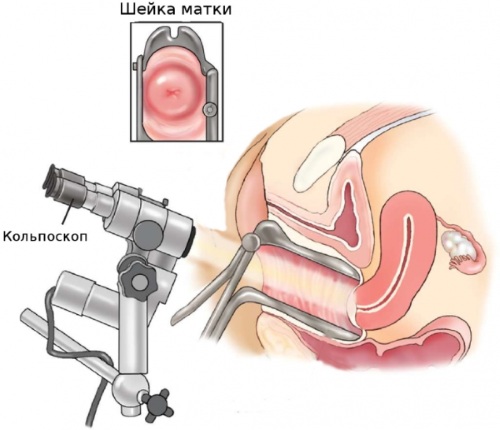Content
- Possible reasons
- Physiological
- Pathological
- Other reasons
- Diagnostics
- Treatment methods
- Normalization of lifestyle
- Prescribing a therapeutic diet
- Taking melatonin
- Hormonal drugs
- Antibiotics
- Treatment of polycystic ovary
- Operative treatment
- Folk remedies
- Vitamin and mineral complexes
- Potential consequences and complications
- Video about delayed menstruation
The monthly cycle is ideally 21-25 days. Each woman has her own personal duration, but for most, the cyclical changes in the organs of the reproductive system are equal or differ from each other by no more than 5 days. Delay of 7-8-10 days always has pathological or natural causes.
Possible reasons
In the vast majority of women, the menstrual cycle lasts 21-35 days, often with deviations in different directions for up to a week.
Cycle regulation corresponds to 5 levels:
- I is associated with the cerebral cortex, which means that any experience can lead to irregular menstruation. For example, it is known that during the war women did not have periods, this was called "amenorrhea during the war."
- II level of regulation is the hypothalamus, which is the link between the nervous and endocrine systems.
- III level - pituitary gland. In the latter, hormones are produced: stimulating and luteinizing follicles or gonadotropic hormones.
- IV level, when, under the influence of hormones, estrogen or progesterone begins to be synthesized in the ovaries (depending on the stage of menstruation).
- V level of regulation - uterus, fallopian tubes and vagina. Changes in the endometrium occur in the uterus, the fallopian tubes contract, facilitate the meeting of the egg and sperm cells, and the epithelium is regenerated in the vagina.
A delay of 8-10 days, the reasons for which can be caused by both a slight malfunction and a violation of hormonal levels, general health or other pathologies, should be determined by a doctor.
The causes of menstrual irregularities are many and varied.
They can be conditionally divided into 3 groups.
- Physiological.
- Pathological.
- Violations associated with the use of drugs both at the time of their administration and after discontinuation. It can be hormonal birth control pills, glucocorticoids, anticoagulants and antiplatelet agents, anticonvulsants, antidepressants and many others.
Physiological
A constant delay in menstruation can be associated with age-related and functional changes in the reproductive system.
-
Puberty in girls. The gradual maturation of girls leads to their first menstrual cycle, usually between the ages of 12 and 13. However, in adolescence, the reproductive system is not yet fully established, so cyclical disruptions are possible. A delay in menstruation in adolescents occurs during the first 2 years, after this period it can be a sign of the disease. If menstruation did not appear before the age of 15, this is a reason to visit a gynecologist. If your irregular period is accompanied by obesity, excessive body hair growth, voice changes, and profuse menstruation, you should seek medical attention in order to start correcting in time violations.

- Restoring the postpartum menstrual cycle. After childbirth, the cyclicality in many women does not recover immediately, especially if the woman feeds the baby with her own milk. Milk production is driven by the hormone prolactin, which simultaneously inhibits progesterone synthesis and ovulation. Recovery of menorrhea after childbirth occurs after 2 months. But there are times when it takes from 3 months to six months to recover.
- Menopause. Over time, reproductive function in women decreases. At 45-50 years of age, a delay in the menstrual cycle, a violation, a change in the duration of discharge is possible.
- Physiological anovulation. Researchers don't know why there are periods without ovulation during certain months. Cyclical lag often occurs during these periods.
Pathological
A delay of 8-10 days (the reasons for the violation of the cyclicity of menstruation are often associated with gynecological diseases) is observed with polycystic ovaries. The disorder may be accompanied by inflammatory diseases of the reproductive organs that have arisen after hysteroscopy or miscarriage.
- Ovarian dysfunction is sometimes the result of abnormalities in the pituitary gland and other organs that regulate a woman's hormones. The defeat of the pituitary gland can occur with an increase in areas of the neighboring brain or these structures themselves, bleeding in this department (as a result of childbirth).
- A delay in the menstrual cycle can occur against the background of endometriosis, chronic endometritis, and disorders of the uterus.
- Abortions, hysteroscopy sometimes cause a delay in menstruation. During the operation, the endometrial layer is removed, it takes time to recover.
- Chronic gastritis, diabetes, diseases of the urinary system, breast cancer, in which organs and systems of the body are affected, cause cyclic disturbances.
- SARS, flu. Diseases are stressful for the body, weaken the immune system, so minor deviations in the cycle are possible.
- The presence of gynecological diagnoses, such as: cervicitis, hypoplasia, endometrial polyps, endometriosis, follicular disorders, neoplasms (uterine fibroids, cysts, cervical cancer) cause delay menstruation.
- Hormonal disorders: hyperprolactinemia, adenoma of the thyroid gland, pituitary or adrenal gland, ovarian dysfunction always affect the duration of the cycle.

Delay 7-8-10 days. Causes
A delay in menstruation occurs with some diseases:
- epilepsy;
- neurosis and other mental disorders;
- blood diseases;
- diseases of the adrenal glands, accompanied by a violation of the hormonal background.
Other reasons
A delay in the cycle from 7 to 10 days is sometimes associated with a violation of circadian rhythms, poisoning of the body. The constant exposure to harmful factors is the cause of the failures that occur. As a result, delays can occur every month.
- Alcohol, nicotine, drugs or contact with toxins and chemicals, or night work, kicks in at natural timing and the cycle is disrupted.
- The most common cause of delayed menstruation is stress. Nervous shocks, chronic lack of sleep, difficulties in the family and at work, exams, financial difficulties and uncertainty about the future - all this affects the work of the hypothalamic-pituitary-ovarian systems. This leads to a failure of the luteal phase in a woman.
-
Obesity. Adipose tissue takes part in the metabolism of sex hormones and acts as a depot. With sharp fluctuations in weight, the production of hormones does not keep pace with the build-up or loss of adipose tissue. With a passion for diets, a deficiency of one or more essential elements inevitably occurs, which leads to cycle disturbances. A very difficult situation is anorexia. In this case, menstruation completely stops due to the threat to life.

Obesity table for women - Increased physical activity. For professional athletes and women doing hard work, delayed menstrual periods are a common problem.
- Climate change and time zone. Vacation in a hot country in January or frequent business trips contribute to menstrual irregularities.
- Medicines. With prolonged use of antidepressants, steroids, diuretics, psychotropic drugs, side effects often develop, for example, a delay in the menstrual cycle.
- Canceling or taking hormonal drugs. If a woman took birth control pills for several years, she did not develop sex hormones. After you stop taking hormonal drugs, it takes 2-3 months to return to your usual rhythm. When taking contraceptives, even disposable ones, there is a real blow to the system for producing your own hormones, so there may be a delay.
Diagnostics
Every woman should pay attention to her health. Delay can occur, for example, after acute viral airway inflammation, influenza, malnutrition or stress.
This may be accompanied by symptoms:
- Lower abdominal pain. However, this symptom may appear monthly at the beginning of the menstrual cycle, which, rather, indicates a hormonal imbalance.
- Slight bleeding, different consistency and even color of the discharge.
If menstruation does not occur for more than 5 days, the woman experiences pain in the lower abdomen, delays occur every month, you should definitely see a doctor.
Lack of medical care will lead to diseases:
- polycystic;

- dysfunction of the ovaries;
- salpingophoritis.
If there is a delay in which the chest hurts, it is necessary to consult a gynecologist or mammologist (women over 35).
It is best to undergo diagnostics to refute or confirm suspicions. The sooner treatment begins, the more chances you have to avoid various surgical procedures that will definitely affect a woman's physical attractiveness.
A delay of 2-3 days is normal, especially if it was preceded by acute viral infections, influenza and other diseases that deplete the body. Over time, your period will improve.
A delay of 7-8-10 days, the reasons for which are incomprehensible, but at the same time there is a brownish discharge, should alert the woman and be the reason for going to the doctor.
Diagnostic research includes:
- conducting a standard gynecological examination;
- blood test for the concentration of hCG;
- study of ovarian and pituitary hormones;
- Ultrasound of the pelvic organs;
- MRI or CT scan of the brain.
It is recommended to conduct examinations in the same clinic where the specialist consultation is carried out. This is necessary because each laboratory has its own reference values and equipment indicators.
A standard gynecological examination reveals:
- the presence of pathologies of the external genital organs;
- signs of bartholinitis;
- symptoms characteristic of increased or decreased levels of estrogens or androgens;
- the presence of genital warts, manifestations, atrophic changes;
- condition of the cervix.
In addition to the examination on the gynecological chair, a bimanual examination is carried out. It includes probing the walls of the vagina, its vaults, the cervix, the body of the uterus and ovaries for tumors, seals, fibroids, abnormalities in the size and density of the uterus and ovaries.
- The average cost of consulting a gynecologist together with an examination is 800-2 thousand rubles. RUB 500
- A blood test for hCG is necessary to identify menstrual irregularities associated with cancer. Normally, hCG increases during pregnancy and accompanies the maturation of placental tissues. In the absence of pregnancy, malignant tumors are responsible for the increase in hCG levels. The average cost of the analysis is 400-800 rubles.
- Tests for pituitary and ovarian hormone levels are necessary to differentiate gynecological diseases, ovulation disorders and early menopause. The standard list of hormones includes estradiols, progesterone, cortisol, follicle stimulating hormone, thyroid stimulating hormone, luteinizing hormone, and prolactin. The cost of a comprehensive examination varies between 2-5 thousand. rub.
- To clarify the state of the ovaries or uterus, an ultrasound of the pelvic organs is prescribed. The procedure will cost $ 1,000. 300-3 thous. rub.
- MRI detects abnormalities in the brain.
- CT scan detects the smallest changes in blood supply disturbances, neoplasms, or traumatic changes. The price varies between 5-15 thousand. rub.
Treatment methods
A delay of 7-8 days, the reasons for which do not have a pronounced factor, should be a cause for concern and a visit to the doctor. Treatment methods are prescribed depending on the cause.
Normalization of lifestyle
In the event of disruptions in the menstrual cycle due to stress, it is necessary to restore the usual way of life. Taking sedatives or antidepressants may help.
Drugs are prescribed in a course of at least 14 days, antidepressants - at least 3 months. For example, Afobazol is dosed at 10 mg 3 times a day for 14-28 days. The drug Zoloft is prescribed 1 time per day, 50 mg for 3-4 weeks.
If you lose your menstrual flow due to heavy intense physical exertion, you should cancel your workouts or slow down their intensity.
Prescribing a therapeutic diet
In case of a lack of body weight, a diet aimed at increasing muscle mass is prescribed. The diet includes marine fish, lean meats, dairy products, vegetable proteins and complex carbohydrates. The diet should be followed for several months until the individual BMI is normalized.
With excessive body weight, weight loss is recommended. When composing a diet, it is necessary to include meals with complex carbohydrates in the form of vegetables, lean meats and fish. Light carbohydrates, fast food, and fatty foods should be avoided. The duration will be adjusted by the dietitian until the optimal BMI returns.
Taking melatonin
A delay of 7 days, the reasons for which are associated with the frequent change of time zones, is restored by the use of melatonin. The drug is responsible for the cyclicity of sleep-wakefulness and the normalization of the rhythm of life.
Melatonin is part of Melaxen, Circadine and Melapur. It is prescribed for 30-90 minutes. until the desired bedtime. Stabilization is achieved within 7-10 days, after which the drug is canceled.
Hormonal drugs
A number of medicines are used to normalize the duration of menstruation.
| Name of drugs | Action |
| Remens and Cyclodinone | They will help restore the normal cycle. The course is at least 3 months according to the recommended dosage regimen. |
| Regulon, Yarina, Diane-35 | Disruptions associated with hormonal disorders must be corrected with oral contraceptives. You must first pass the analysis of the hormonal panel to select the optimal drug. The general principle is to take 1 tablet daily at the same time for 21-28 days. Menstruation occurs within 2-3 days after taking the last tablet with the active ingredient. The course ranges from 3 months to lifelong use. |
| Utrozhestan, Dyufaston | In case of violation of the luteal phase, drugs with a progesterone analog are prescribed. Reception is carried out at bedtime at a dosage of 200-300 mg for 10 days, starting from the 17th day of the menstrual cycle. This is necessary to replenish the circulating blood volume during antianemic therapy. |
Hormonal treatment is prescribed after histological examination. It can be combined with oral contraceptives in a standard set. If the cycle disorders are associated with pain in the uterus, then the problem is solved by endometrial ablation or hysterectomy.
Antibiotics
Interruptions in the duration of the cycle caused by bacterial invasion are restored after the use of antibiotics. Before choosing a course of therapy, a smear is taken for antibiotic sensitivity. The average course of treatment is 7-10 days and does not require additional measures.
Treatment of polycystic ovary
Elimination of the symptoms of polycystic disease is necessary to normalize metabolism. First-line drugs include Metformin, Pioglitazone, Spironolactone.
The dosage depends on the therapy regimen, the patient's age and the dosage form used.
Operative treatment
If neoplasms or cancerous tumors are found, surgical treatment is offered. Removal of formations leads to the restoration of hormonal levels and the normalization of menstruation.
Folk remedies
The use of traditional medicine brings a weak therapeutic effect and is aimed at strengthening the body. The main factor for efficiency is regularity.
Foot baths with mustard powder, chamomile, string or sea salt should be done twice a day. The water temperature should not be hot. A decoction of a medicinal plant is infused for 30 minutes, and then diluted in a container with warm water.
The following decoctions restore blood circulation:
- To restore the regularity of menstruation, a decoction of onion peels is used. To achieve maximum effect, the broth is taken in the morning on an empty stomach. Cooking requires 50 g of husk, filled with 500 ml of water and infused over the fire for 15 minutes. The course of treatment is 2-3 days with the use of ½ glass in the morning on an empty stomach.
- Wormwood root, 2 tbsp. l., brewed in 0.5 liters of boiling water. The idea is to filter the broth and insist for at least 3 hours. The course of treatment is 2 weeks with the use of 150 g of infusion 3 times a day.

- Chamomile tea with flax seeds helps restore menstruation. The seeds are fried in a dry frying pan until a brownish hue appears and pour 1 liter of boiling water with chamomile. After infusion for half an hour, the tea is ready to drink.
Vitamin and mineral complexes
Lack of vitamins affects the regularity of menstruation. When hypovitaminosis is detected, vitamin and mineral complexes are prescribed.
The composition includes vitamins A, C, E, B12, stimulating the production of hormones and restoring the contractile function of the uterus.
Potential consequences and complications
Lack of examination and non-compliance with doctor's prescriptions can lead to the development of diseases and further infertility.
Hormonal disorders provoke the development of:
- diabetes mellitus;
- hypothyroidism;
- adrenal tumors;
- changes in blood coagulation.
The appearance of systemic pathologies leads to disturbances in the general metabolism and the appearance of many side effects. In the case of the development of hyperplastic processes, there is a threat of uterine cancer. In addition, the absence of menstruation can lead to early miscarriages, osteoporosis and cardiovascular disease.
A delay in menstruation for more than 7 days is the reason for contacting a medical institution. In addition to pregnancy, other reasons also lead to imbalance: hormonal disruptions, the presence of an infectious process or the formation of neoplasms. Timely diagnosis and treatment can help restore normal cycle length and prevent complications.
Video about delayed menstruation
Delay of menstruation. Violation of menstruation:



